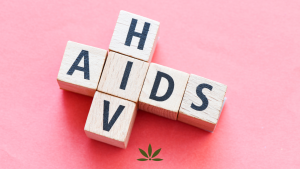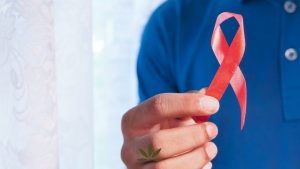Medical Cannabis for HIV/AIDS & The Unstoppable Advocates we Honor
In 2019, the Centers for Disease Control and Prevention (CDC) estimated that 1.2 million people live with HIV in the United States, although infection rates are on a noticeable decline. Approximately 34,800 people received an HIV diagnosis in 2020. Of those infected with HIV, 13% don’t know they have the virus.
This article will look at the viruses HIV and AIDS, and how medical cannabis advocates like Dennis Peron and Brownie Mary set the stage for the medical cannabis programs we access today.
What is HIV and AIDS?
HIV (human immunodeficiency virus) is a virus that attacks the body’s immune system, and if left untreated, it can lead to AIDS (acquired immunodeficiency syndrome). AIDS is the most severe state of HIV, where the immune system has been badly damaged, making them susceptible to other severe illnesses called opportunistic infections (OIs).
Symptoms of the virus vary by the state of progression of the virus but may include loss of body weight, change in appetite, nausea, vomiting, neuropathic pain, inflammation, sleep disturbances, anxiety, depression, and mood disorders.
Much of why we can offer medical cannabis certifications across multiple states at Compassionate Clinics of America is largely due the advocacy of those who saw cannabis as a way to decrease some of the symptoms associated with HIV or AIDS. Because HIV/AIDS has been recognized as an eligible condition for medical cannabis programs since their earlier days, there is a decent body of research looking into how medical cannabis may help HIV/AIDS patients.
Medical Cannabis for Symptoms of HIV/AIDS
As we mentioned above, the symptoms associated with HIV/AIDS will depend on the stage of progression of the virus. The stages are as follows:
- Stage One: the stage where a person may experience flu-like symptoms and have a large amount of the HIV infection in their blood
- Stage Two: when the virus has gone into latency, where people may feel asymptomatic. Many people with the virus stay within stage two and never progress into stage three, provided the infection is being consistently treated by a method determined by their doctor.
- Stage Three: when the virus has progressed to AIDS, and the immune system has weakened

Below is some of the research on how medical cannabis may help people manage the symptoms of HIV. However, we will stress that medical cannabis is not a cure or treatment for HIV. We always recommend that HIV patients follow the prescribed regimen of their overseeing doctor, using medical cannabis only as a method to relieve some symptoms.
Loss of Body Weight
A 2005 UK study from Imperial College and Chelsea and Westminster Hospital examined the efficacy of medical cannabis for 143 HIV patients, 64 of whom complained of weight loss.
45% indicated that cannabis made this complaint “much better”, 24% reported “little better”, and 31% reported no change.
Patients in this study said that cannabis helped with increased appetite and alleviating nausea, which helps with food intake to maintain a healthy weight.
Changes in Appetite & Low Caloric Food Intake
THC has been widely accepted as an appetite stimulant. A 2007 study in the Journal of Acquired Immune Deficiency Syndromes looked at how ten HIV-positive participants’ food intake was affected when administered the synthetic cannabinoid Dronabinol (“Marinol”). They observed that Dronabinol increased daily food intake by increasing the number of times participants ate throughout the day.
Researchers also believe there is a tie between THC and the hormones stimulating hunger. A 2011 University of California study of seven HIV-infected men measured insulin levels and plasma levels of ghrelin, leptin, and PYY in HIV-infected subjects before and after receiving smoked cannabis or a placebo in a clinical trial.
Researchers showed that both ghrelin and leptin levels increased with cannabis treatment, stimulating hunger and appetite. These hormones decreased or remained unchanged in those who received a placebo.
Mood Disorders, Anxiety, and Depression
The 2007 study referenced above also looked at the effects of oral Dronabinol (“Marinol”) and smoked cannabis observing a wide range of behaviors in HIV-positive cannabis smokers. The study concluded that oral Dronabinol and smoked cannabis “improve mood without producing disruptions in psychomotor functioning”.

Neuropathic Pain from HIV
A 2009 single-group, double-blind, placebo-controlled crossover trial published in Neuropsychopharmacology assessed the impact of smoked cannabis on neuropathic pain in 28 subjects with HIV. 48% of patients stated that cannabis was associated with “clinically meaningful” (aka. noticeable) pain relief.
Cannabis for HIV-Related Inflammation
Various studies have looked at cannabis for inflammation in general, but few have looked at inflammation in HIV. However, a 2021 review of inflammation research, as well as studies that had been done on HIV patients, showed positive potential for cannabis for inflammation of the body and brain in people with HIV. This review indicates that more specific research on inflammation for HIV patients is needed.
Slowing the Progression of the Virus & Immune Suppression
In 2012, Mount Sinai School of Medicine researchers discovered that cannabis-like chemicals trigger receptors in human immune cells that can directly inhibit a type of HIV. By treating the cells with a cannabinoid agonist that activates the CB2 receptors, the CB2 blocks the signaling process and suppressed infection in resting immune cells. Research is also developing to look at how cannabis can influence the increase of CD4 counts.
Another 2017 study looked at daily cannabis use and viral suppression for HIV patients, concluding that there was a correlation between daily cannabis use and lower counts but that these lower counts could be due to various factors, and cannabis use couldn’t be acknowledged as the contributing factor.
Dennis Peron and Brownie Mary: Heroes of Medical Cannabis
Those who have been a part of cannabis culture for a long time will often point to two San Francisco-based advocates who fought for patient rights for access to medical cannabis in the early 1990s: Mary Jane Rathbun and Dennis Peron.
Mary Jane Rathbun, aka “Brownie Mary,” began making cannabis-infused brownies for those who were dying from AIDS in the early 1980s. She was estimated to be baking and distributing up to 1,600 brownies a month to AIDS patients in San Francisco. She experienced three arrests and a felony possession charge for her brownie distribution. Brownie Mary died in 1999.
Founding the San Francisco Cannabis Buyers Club in 1996 with the help of Brownie Mary, Dennis Peron was moved to advocate for safe and legal access to cannabis after his partner Jonathan West died of AIDS-related illnesses. Having used cannabis medicinally, West and Peron experienced a raid on their home before West’s death, having Peron vow to ensure no one using cannabis for HIV or AIDS-related symptoms would have to face persecution again.

In 1996, Peron co-authored California’s Proposition 215 with Brownie Mary by his side, which would eventually be passed to permit the use of medical cannabis, but not before the San Francisco Cannabis Buyers Club was raided one last time. He has been called the Father of Medical Cannabis. Dennis Peron died in 2018.
We are grateful for the efforts of Brownie Mary and Dennis Peron to legalize medical cannabis for HIV/AIDS patients, as well as all the advocates who have helped us to get where we are.
Watch our video about Brownie Mary and Dennis Peron here:
Explore Medical Cannabis for HIV/AIDS Symptoms
If you have received a positive result on an HIV test, are in the latent state of HIV, or have AIDS, consider exploring a medical cannabis certification to help manage some of the symptoms of the virus. As we stated above, medical cannabis is not a cure or treatment for HIV or AIDS and should not be used as a replacement for other therapies prescribed by your overseeing physician.
Reach out to Compassionate Clinics of America to discuss whether a medical cannabis certification is right for you. Know that you’re not alone as you navigate life with HIV or AIDS. Our compassionate physicians will listen to your concerns and discuss options for cannabis products for your specific symptoms. Our process is easy, and efficient, and will allow you to access medical cannabis products within medical dispensaries in your state.























